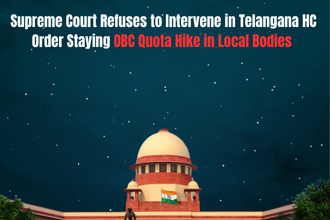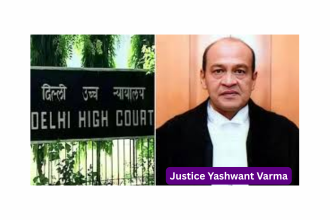In a significant ruling impacting local governance and reservation policies, the Supreme Court of India on Thursday refused to interfere with the Telangana High Court’s order staying the State government’s decision to raise Other Backward Classes (OBC) reservations in local bodies from the existing quota to 42 per cent.
The Telangana government’s move, announced in September ahead of the local body elections, had effectively pushed total reservations (OBC, SC, and ST) to 67 per cent, breaching the 50 per cent ceiling traditionally upheld by the Supreme Court.
Supreme Court Dismisses Telangana’s Plea
A Bench comprising Justice Vikram Nath and Justice Sandeep Mehta dismissed the State’s special leave petition challenging the Telangana High Court’s interim order dated October 9. The apex court clarified that local body elections can continue without implementing the increased OBC quota and that the High Court may decide the issue on merits in due course.
“You may continue with your elections… (State’s appeal) dismissed. The order shall not affect the High Court in deciding the case on its own merits,” the Bench observed.
The Supreme Court’s decision effectively means that the stay on the OBC quota hike remains in force, and the upcoming elections to municipalities and panchayats will proceed under the existing reservation framework.
Background: The Government Orders and High Court Stay
The controversy stems from three Government Orders (GOs) issued by the Telangana government on September 26, 2025. One GO increased the OBC reservation to 42 per cent in local bodies, while the other two laid out guidelines for implementing the enhanced quota across different tiers of local governance — Mandal Praja Parishads, Zilla Praja Parishads, and Gram Panchayats — under the Telangana Panchayat Raj Act, 2018.
Following this decision, multiple petitions were filed before the Telangana High Court, challenging the GOs on constitutional grounds. Petitioners argued that the move violated the 50 per cent ceiling on reservations established through a series of Supreme Court judgments, including the landmark Indra Sawhney v. Union of India (1992) ruling.
On October 9, a Division Bench of the Telangana High Court, comprising Chief Justice Aparesh Kumar Singh and Justice GM Mohiuddin, stayed the operation of the GOs. The Court held that prima facie, the increase appeared to violate the constitutional and judicially recognized upper limit of 50 per cent reservations.
“Such an increase in the OBC quota appears to breach the ceiling limit laid down by the Supreme Court in multiple precedents. Hence, the operation of these GOs is stayed. However, elections may continue without implementing the enhanced quota,” the High Court observed.
State Government’s Argument Before the Supreme Court
Senior Advocate Abhishek Manu Singhvi, appearing for the State of Telangana, argued that the High Court erred in staying the GOs without detailed pleadings or examination of evidence. He contended that there is no absolute or inflexible 50 per cent cap on reservations under Indian constitutional jurisprudence.
“This is a policy decision of the government, supported unanimously by all political parties. How can it be stayed without pleadings? No challenge has been made to the parent Act—only to its implementation,” Singhvi submitted.
He further argued that the Indra Sawhney judgment did not impose a rigid ceiling but allowed exceptions in cases where the backward class population is proportionally higher.
“There is a misconception that the 50 per cent limit is absolute. The judgment allows exceeding it under exceptional circumstances. If a State has an OBC population exceeding 70 per cent, how can you restrict reservations to 50 per cent?” he questioned.
Singhvi urged the Court to reconsider the broader constitutional question of whether the 50 per cent ceiling should remain inviolable in today’s demographic and social context.
“Your Lordships may be laying down an inflexible rule for the entire country. It is time to re-examine whether the ceiling should be reconsidered,” he said.
Respondents’ Argument: Upholding Constitutional Limits
Opposing the State’s appeal, Senior Advocate Gopal Sankaranarayanan, representing one of the petitioners before the High Court, defended the stay order. He emphasized that the *reservation hike to 42 per cent for OBCs pushed overall quotas beyond 60 per cent, violating established constitutional principles.
“The government order we challenged increased reservation to 42 per cent, taking total reservations to well over 60 per cent. The Krishnamurthi judgment—a Constitution Bench ruling—interpreted these provisions and reaffirmed that reservations must remain within the 50 per cent limit,” Sankaranarayanan argued.
He distinguished between Indra Sawhney, which pertained to reservations for socially and educationally backward classes (SEBCs), and the present context involving political reservations in local bodies, where the 50 per cent ceiling has been consistently upheld by courts.
“Indra Sawhney dealt with employment reservations. In the context of political reservations in local bodies, the ceiling is firm,” he added.
Supreme Court’s Observations
After hearing both sides, the Supreme Court declined to interfere with the High Court’s interim order. The Bench stated that there was no urgency to alter the status quo and that the High Court remains free to decide the matter independently on constitutional and factual grounds.
The dismissal of the appeal effectively maintains the 50 per cent reservation limit in the ongoing and upcoming panchayat and municipal elections in Telangana.
The case—State of Telangana vs Buttemgari Madhava Reddy—will continue before the Telangana High Court, which is scheduled to take up the matter in December 2025.
The 50% Reservation Debate: Constitutional Context
The 50 per cent ceiling rule originates from the Indra Sawhney (Mandal Commission) judgment (1992), where a nine-judge Bench held that total reservations in public employment and education should not exceed 50 per cent, except in extraordinary circumstances.
Subsequent judgments—such as M. Nagaraj v. Union of India (2006) and Krishnamurthy v. Union of India (2010)—reaffirmed this principle, extending it to political reservations in local self-government institutions as well.
However, some States have sought to challenge this limit in recent years, citing regional disparities and demographic variations. The Supreme Court’s 2021 ruling striking down the Maharashtra OBC quota in local bodies reiterated that exceeding the 50 per cent limit violates the equality principle unless backed by rigorous empirical data.
Implications for Telangana and Beyond
The Supreme Court’s refusal to intervene underscores the judiciary’s consistent adherence to the 50 per cent rule, especially in the context of local body reservations. The decision may also serve as a precedent for other States attempting to expand OBC quotas without sufficient constitutional backing.
For Telangana, the ruling means that the upcoming local body elections will be conducted under the existing reservation structure, without the proposed OBC hike. It also places pressure on the State to justify any future quota expansions through detailed data and compliance with constitutional requirements under Articles 243D and 243T.
Conclusion
The Supreme Court’s dismissal of the Telangana government’s appeal marks a crucial affirmation of the judicially set reservation ceiling. While the State contends that demographic realities warrant flexibility, the Court’s stance signals continued judicial restraint and fidelity to the constitutional balance between equality and affirmative action.
As the Telangana High Court prepares to hear the matter in December, the outcome could shape the future of reservation policy in India’s local governance system—potentially reopening the debate on whether the 50 per cent cap remains justifiable in a diversifying social fabric.
Also Read



